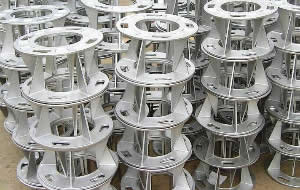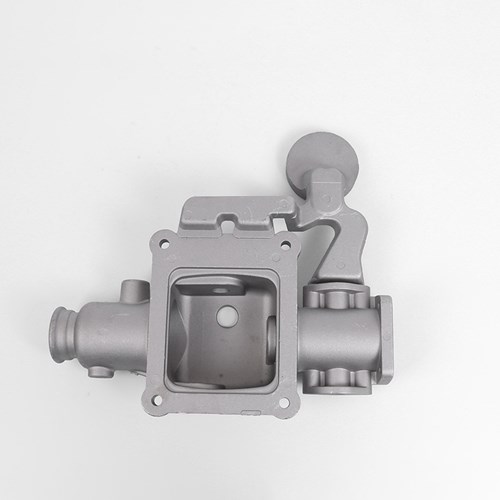Discover the Benefits of Aluminum Casting in Modern Production
Aluminum casting has arised as a pivotal process in modern production. Its light-weight yet durable nature provides substantial advantages for numerous sectors. The capacity to accomplish elaborate designs and preserve limited resistances contributes to its appeal. Aluminum Foundry. In addition, the cost-effectiveness and ecological benefits make it a sustainable selection. As manufacturers seek innovative options, the function of aluminum casting remains to develop. What particular applications and benefits await expedition in this vibrant field?
Lightweight Yet Solid: The Benefits of Aluminum
Many materials are used in manufacturing, aluminum stands out due to its amazing combination of light-weight residential or commercial properties and remarkable strength. This unique attribute makes aluminum an optimal option for different applications, particularly in sectors such as auto, aerospace, and building and construction. Its low density enables less complicated handling and transport, adding to reduced energy intake during manufacturing and assembly processes.
Moreover, aluminum's strength-to-weight proportion is impressive, allowing producers to create long lasting components without adding unneeded bulk. This characteristic is particularly beneficial in industries where weight decrease can result in improved fuel effectiveness and overall performance. Furthermore, aluminum's resistance to rust boosts the longevity of products, additionally strengthening its allure in modern production.
Inevitably, the lightweight yet strong nature of aluminum settings it as a favored product, cultivating innovation and efficiency across several markets. Makers significantly recognize that these benefits can cause significant improvements in layout and functionality.
Precision and Complexity in Layout
As producers embrace the abilities of aluminum casting, they discover new avenues for precision and complexity in design. This manufacturing procedure enables the production of elaborate shapes and in-depth attributes that typical approaches often have a hard time to accomplish. The fluidness of liquified aluminum allows it to load intricate mold and mildews, causing components with limited tolerances and great surface area coatings.
This precision is especially helpful in sectors such as aerospace and auto, where precise specifications are essential for performance and security. Aluminum casting also accommodates ingenious designs that enhance capability without compromising architectural honesty.

Cost-Effectiveness and Performance
Cost-effectiveness and efficiency are extremely important considerations for makers discovering aluminum casting as a production method. Aluminum casting offers considerable expense advantages as a result of its reduced material prices compared to other steels (Precision aluminum casting). The light-weight nature of aluminum reduces delivery and handling expenditures, and its outstanding thermal conductivity permits for quicker cooling times during the casting procedure, boosting overall manufacturing rate
Aluminum's versatility makes it possible for makers to produce complicated shapes and layouts, lessening the requirement for additional machining or setting up. This streamlining of manufacturing not only reduces labor costs yet likewise reduces preparations, enabling companies to react quickly to market demands.
The sturdiness and corrosion resistance of aluminum spreadings add to longer item life expectancies, decreasing replacement costs over time. Consequently, suppliers can attain an equilibrium of top notch outcome and decreased operational costs, making aluminum casting a progressively appealing option in modern manufacturing.
Ecological Sustainability of Aluminum Casting
Aluminum casting stands apart as sites an eco sustainable production choice, specifically as a result of its recyclability and minimized ecological impact. The process allows for the reliable use aluminum, a material that can be reused indefinitely without shedding its residential properties. This characteristic substantially reduces the demand for virgin aluminum, consequently decreasing and preserving all-natural sources energy consumption connected with my sources extraction and processing.

Applications Throughout Industries: From Automotive to Aerospace
While diverse industries continue to seek innovative materials for manufacturing, aluminum casting has proven to be a versatile service across industries such as automobile and aerospace. In the automotive market, aluminum spreadings contribute to lightweight vehicle designs, enhancing gas effectiveness and performance. Elements like engine blocks, transmission real estates, and wheels benefit from aluminum's strength-to-weight proportion.
Likewise, in aerospace, aluminum casting plays a considerable function in producing complicated components that require high longevity and low weight. Aircraft parts such as brackets, landing equipment, and structural frameworks make use of aluminum for peak performance and safety.
The versatility of aluminum casting permits it to provide to other markets, consisting of customer electronics, marine, and industrial equipment. This convenience not only meets the certain needs of numerous applications but likewise sustains recurring technology in manufacturing processes. Therefore, aluminum casting stays a principal in modern production across many fields.
Regularly Asked Questions
How Does Aluminum Casting Compare to Other Metal Casting Processes?
Aluminum casting offers superior strength-to-weight ratios, faster cooling rates, and outstanding corrosion resistance contrasted to other steel casting processes. These advantages make it perfect for various applications, enhancing efficiency and performance in production.
What Are the Typical Lead Times for Aluminum Casting Projects?
Normal lead times for aluminum casting jobs vary from 2 to eight weeks, depending on aspects such as intricacy, order dimension, and manufacturing important site capacity. Effective preparation can help reduce hold-ups and boost project timelines.
Can Aluminum Casting Be Utilized for Intricate Styles?
Aluminum casting can without a doubt accommodate intricate styles. Precision aluminum casting. Its fluidity enables thorough patterns and forms, making it suitable for intricate elements in numerous sectors. This versatility improves layout liberty while maintaining architectural stability and performance
What Post-Processing Options Are Available After Aluminum Casting?
Post-processing alternatives for aluminum casting consist of machining, brightening, surface therapies, anodizing, and welding. These techniques boost the coating, enhance dimensional accuracy, and rise rust resistance, thereby maximizing the last product's performance and visual appeal.
Exactly How Do Temperature Adjustments Impact Aluminum Casting Quality?
Temperature level changes substantially effect aluminum casting top quality by impacting fluidness, solidification prices, and prospective flaws. Rapid cooling can lead to increased brittleness, while too much warmth might create bending or insufficient dental filling of molds during casting.
Aluminum casting has actually emerged as an essential process in modern-day production. As makers accept the capabilities of aluminum casting, they find new opportunities for precision and intricacy in style. Aluminum casting processes typically generate fewer greenhouse gas exhausts compared to various other metal casting approaches. While varied industries proceed to look for innovative products for manufacturing, aluminum casting has actually verified to be a flexible service throughout industries such as automobile and aerospace. In the auto sector, aluminum spreadings add to light-weight lorry styles, enhancing gas efficiency and performance.